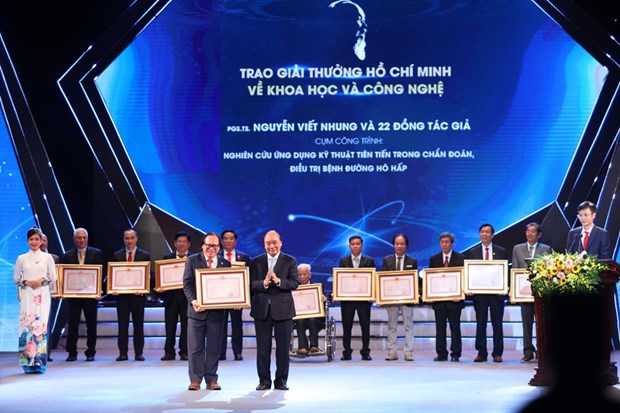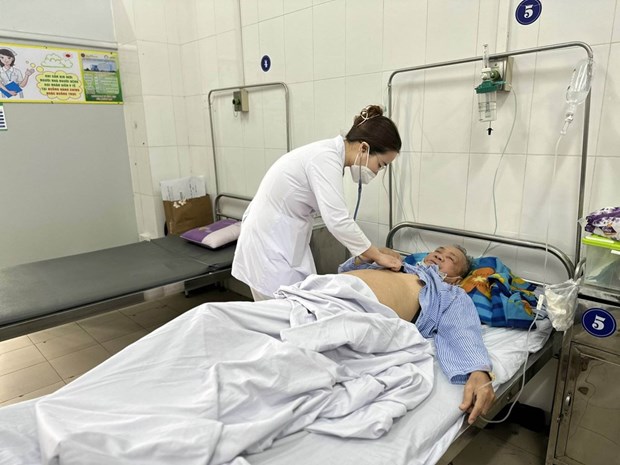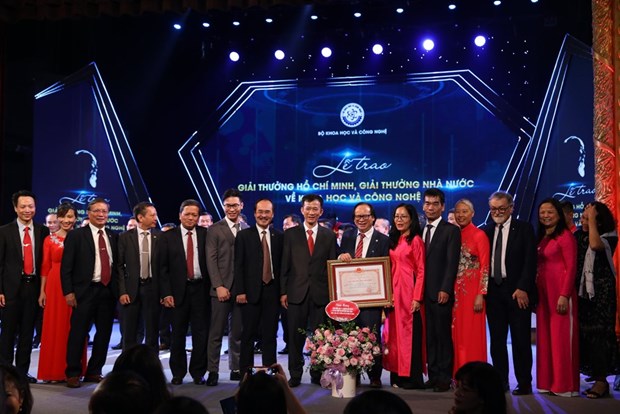Hanoi (VNA) – A project on the research and application of advanced technologies in diagnosis and treatment of respiratory diseases in Vietnam, which was carried out by a group of and helped save thousands of patients from Tuberculosis (TB), has been honoured with the .
 Associate Prof. Nguyen Viet Nhung, on behalf of the author group, receives the award (Photo: VietnamPlus)
Associate Prof. Nguyen Viet Nhung, on behalf of the author group, receives the award (Photo: VietnamPlus)The work carries great scientific values, aiming to settling a tough public health issue in respiratory diseases in Vietnam, especially TB. It is the joint effort of scientists from many agencies across the country.
TB burden in Vietnam
Associate Prof. Nguyen Viet Nhung, former Director of the National Lung Hospital and Chairman of the Vietnam National Tuberculosis Programme (NTP), one of the authors of the work, said that one of the outstanding achievements of the project is to develop a four-month TB treatment protocol after 40 years with collaboration from foreign scientists. This is an important step forward in putting an end to TB in the world, he said.
The application of the new protocol has saved thousands of TB patients with drug resistance.
It is a result of coordination among leading domestic and foreign scientists from Australia, the US, the Netherlands and the UK.
Statistics from the NTP showed that each year, Vietnam records about 170,000 new TB patients.
According to Associate Prof. Nhung, the project comes up with the idea of active diagnosing and early treating of TB using advanced methods, aiming to reduce fatality. He underlined that a TB patient, without receiving adequate treatment, will face a 20% fatality risk in one year, which will reduce to less than 3% if they get early treatment.
Thanks to the project, the TB burden in Vietnam has dropped, with a reduction rate of about 4.5% annually, much higher compared to the world’s average of 1.5%.
Thanks to TB prevention efforts in the past 10 years, Vietnam has saved 8.78 trillion VND (373.09 million USD), equivalent to preventing 284,000 people from becoming TB patients if there are no prevention and combat measures.
Breakthroughs in TB treatment
The project comprises 23 researches, which have great values in science and technology with the application of many advanced, breakthrough and innovative technologies.
The project, which has a national scale with the number of participants reaching hundreds of thousands, was carried out by a large number of researchers from central to local levels.
 A doctor takes care of a patient at the National Lung Hospital (Photo: VietnamPlus)
A doctor takes care of a patient at the National Lung Hospital (Photo: VietnamPlus)Associate Prof. Nhung said that this project was the first one that implemented a study with a large number of samples from nearly 100,000 people. The Mekong Delta province of Ca Mau was chosen as the key locality for the study. After four years of research, the project proved that the application of new technologies can reduce TB cases faster, by 44%, compared to normal methods. Combining with regular anti-tuberculosis measures, the rate can increase to 72%, he stressed.
“We hope and are working hard for the target, as only after four years of application, the ratio of TB cases in the community has reduced by 72%, the ending of TB is feasible. We hope that this will inspire and strengthen confidence for those who are determined to put an end to TB in the world,” Nhung said.
 Authors of the project (Photo: VietnamPlus)
Authors of the project (Photo: VietnamPlus)Particularly, Nhung said, the shortening of the to only four months is a breakthrough in the treatment of the disease, increasing patients’ ability to adhere to treatment protocol, reducing the risk of serious side effects, and improve the quality of treatment for patients.
The outcomes of the project will enable the Government and the Ministry of Health to issue effective and synchronous medical policies, ensuring that a comprehensive lung healthcare system is provided to all patients, and design strategies and national action programmes on ending TB./.
Source: VietnamPlus
